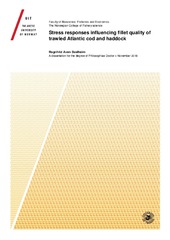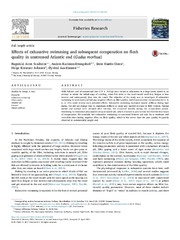| dc.contributor.advisor | Johnsen, Helge | |
| dc.contributor.author | Svalheim, Ragnhild Aven | |
| dc.date.accessioned | 2018-11-26T12:25:27Z | |
| dc.date.available | 2018-11-26T12:25:27Z | |
| dc.date.issued | 2018-12-12 | |
| dc.description.abstract | In this thesis, an experimental swim tunnel and cod-end was used as a model to investigate how stress during various stages of trawl capture affects fillet quality in terms of residual blood, time and hardness of post-mortem muscle stiffness and muscle colour of cod and haddock. In addition, the effect of stress on importance of timing of euthanasia was also addressed.
The first stage of trawl capture that was chosen to study was the herding of fish in front of the trawl mouth. Two experiments were conducted to address this issue. The first involved exhaustive swimming of cod and the second critical swimming speed of haddock. These studies showed that exhaustive swimming causes a moderate stress response that takes longer than 6 hours to recover from and that exercise have a short-lasting effect on muscle texture, but little or no effect on muscle colouration. It was concluded that other stages of trawl capture have a higher impact on fillet quality.
The third work of this thesis aimed to investigate how extreme crowding for 1 or 3 hours in the cod-end, following exhaustive swimming, would affect the physiology and muscle quality of cod. Findings from this study showed that crowding caused a severe stress response and that fish probably suffered from hypoxia due to inability to move their opercula. In addition, fillet quality was significantly reduced due to increased amount of residual blood in the muscles. The detrimental effects of crowding was not fully reversed by recuperation time for 6 hours.
In the last study, the last stage of trawl capture process, i.e. the effect of air exposure on deck, was studied. Fish was stressed by mild crowding and then exposed to air for 15 or 30 minutes, or directly euthanised by terminal blow to the head and then left in air for 0, 15 or 30 minutes before exsanguination. We found that stress/crowding triggered a stronger response to the air exposure by faster increase in residual blood in the muscles, resulting in lower fillet quality. However, direct euthanasia stopped blood flow to the muscle and quality was significantly improved.
Together these four studies show that there is a strong connection between the type of stress inflicted on the fish during capture and the quality of the fish product (fillets). Measures that may secure top quality fish from trawlers, include reducing crowding time in the cod-end and implementing direct euthanasia or live recuperation for more than 6 hours. | en_US |
| dc.description.doctoraltype | ph.d. | en_US |
| dc.description.popularabstract | To obtain the best possible fillet quality, capture should be made as gentle as possible, preferably in a way that allows the fish to move inside the trawl. This is the main conclusion from this Ph.D. study on how trawl capture may influence fillet quality in Atlantic cod and haddock. The objective of the study was to identify critical stages during trawl capture with potential detrimental effects on fillet quality. The experiments were carried out using a swim tunnel attached to an experimental cod end, which allowed us to study physiological stress responses of 1) exhaustive swimming (to mimic swimming in front of the trawl mouth), 2) a combination of exhaustive swimming and crowding in the cod end, and 3) a combination of crowding in the cod end and exposure in air. The results suggest that crowding in the cod end followed by air exposure has a strong impact on fillet quality. Exhaustive swimming on the other hand, only has a minor effect on fillet quality. | en_US |
| dc.description.sponsorship | Research council of Norway | en_US |
| dc.identifier.isbn | 978-8266-162-1 | |
| dc.identifier.uri | https://hdl.handle.net/10037/14238 | |
| dc.language.iso | eng | en_US |
| dc.publisher | UiT The Arctic University of Norway | en_US |
| dc.publisher | UiT Norges arktiske universitet | en_US |
| dc.relation.haspart | <p>Paper I: Karlsson-Drangsholt, A., Svalheim, R.A., Aas-Hansen, Ø., Olsen, S-H., Midling, K., Breen, M. … Johnsen, H.K. (2018). Recovery from exhaustive swimming and its effect on fillet quality in haddock (<i>Melanogrammus aeglefinus</i>). <I>Fisheries Research, 197</i>, 96-104. Accepted manuscript version available at <a href=http://hdl.handle.net/10037/13485>http://hdl.handle.net/10037/13485. </a> Published version also available at <a href=https://doi.org/10.1016/j.fishres.2017.09.006>https://doi.org/10.1016/j.fishres.2017.09.006. </a><p>
<p>Paper II: Svalheim, R., Karlsson-Drangsholt, A., Olsen, S.H., Johnsen, H.K. & Aas-Hansen, Ø. (2017). Effects of exhaustive swimming and subsequent recuperation on flesh quality in unstressed Atlantic cod (<i>Gadus morhua</i>) <i>Fisheries Research, 193</i>, 158-163. Accepted manuscript version available at <a href=http://hdl.handle.net/10037/12728>http://hdl.handle.net/10037/12728. </a> Published version also available at <a href= http://dx.doi.org/10.1016/j.fishres.2017.04.008>http://dx.doi.org/10.1016/j.fishres.2017.04.008. </a><p>
<p>Paper III: Svalheim, R.A., Aas-Hansen, Ø., Heia, K., Drangsholt-Karlsson, A., Olsen, S-H. & Johnsen, H.K. Simulated trawling: Exhaustive swimming followed by extreme crowding as contributing reasons to variable fillet quality in trawl-caught Atlantic cod (<i>Gadus morhua</i>). (Manuscript). Also available at <a href=https://doi.org/10.1101/372581>https://doi.org/10.1101/372581. </a><p>
<p>Paper IV: Svalheim, R.A., Burgerhout, E., Heia, K., Joensen, S., Olsen, S-H., Nilsen, H. & Tobiassen, T. Differential response to air exposure in crowded and uncrowded Atlantic cod (<i>Gadus morhua</i>): Consequences for fillet quality. (Manuscript). <p> | en_US |
| dc.rights.accessRights | openAccess | en_US |
| dc.rights.holder | Copyright 2018 The Author(s) | |
| dc.rights.uri | https://creativecommons.org/licenses/by-nc-sa/3.0 | en_US |
| dc.rights | Attribution-NonCommercial-ShareAlike 3.0 Unported (CC BY-NC-SA 3.0) | en_US |
| dc.subject | VDP::Landbruks- og Fiskerifag: 900::Fiskerifag: 920 | en_US |
| dc.subject | VDP::Agriculture and fishery disciplines: 900::Fisheries science: 920 | en_US |
| dc.subject | VDP::Matematikk og Naturvitenskap: 400::Zoologiske og botaniske fag: 480::Zoofysiologi og komparativ fysiologi: 483 | en_US |
| dc.subject | VDP::Mathematics and natural science: 400::Zoology and botany: 480::Zoophysiology and comparative physiology: 483 | en_US |
| dc.title | Stress responses influencing fillet quality of trawled Atlantic cod and haddock | en_US |
| dc.type | Doctoral thesis | en_US |
| dc.type | Doktorgradsavhandling | en_US |


 English
English norsk
norsk





